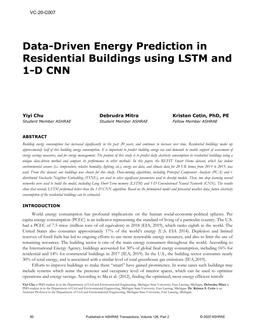
VC-20-C007 — Data-driven Energy Prediction in Residential Buildings using LSTM and 1-D CNN
- Comments Off on VC-20-C007 — Data-driven Energy Prediction in Residential Buildings using LSTM and 1-D CNN
- ASHRAE
Click here to purchase
Building energy consumption has increased significantly in the past 20 years, and continues to increase over time. Residential buildings make up approximately half of this building energy consumption. It is important to predict building energy use and demands to enable support of assessment of energy savings measures, and for energy management. The purpose of this study is to predict daily electricity consumption in residential buildings using a unique data-driven method and compare its performance to other methods. In this paper, the REFIT Smart Home dataset, which has indoor environmental sensors (i.e. temperature, relative humidity, lighting, etc.), energy use data, and climate data for 20 UK homes from 2013 to 2015, was used. From this dataset, one buildings was chosen for this study. Data-mining algorithms, including Principal Component Analysis (PCA) and t- distributed Stochastic Neighbor Embedding (TSNE), are used to select significant parameters used to develop models. Then, two deep learning neural networks were used to build the model, including Long Short-Term memory (LSTM) and 1-D Convolutional Neural Network (CNN). The results show that overall, LSTM performed better than the 1-D CNN algorithm. Based on the formulated model and forecasted weather data, future electricity consumption of the residential buildings can be estimated.
Citation: 2020 Virtual Conference Papers
Product Details
- Published:
- 2020
- Number of Pages:
- 8
- Units of Measure:
- Dual
- File Size:
- 1 file , 1.7 MB
- Product Code(s):
- D-VC-20-C007

